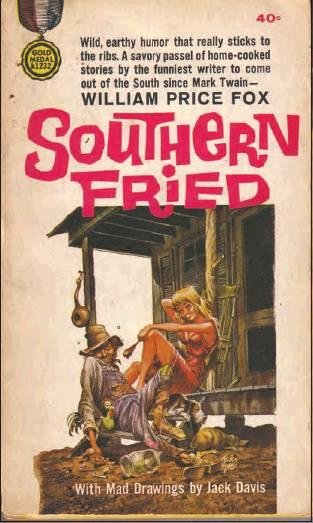Chronicle Book Club
Once a month, local authors and writers will recommend to you their favorite books and favorite writers. They will share with you why they love these books and why you, too, may come to love them.
Southern Fried is more than just chicken
Chronicle Editor Emeritus Jerry Bel-lune recommends you read anything and everything William Price Fox ever wrote, especially when you’re feeling …
This item is available in full to subscribers.
Subscribe to continue reading. Already a subscriber? Sign in
Get 50% of all subscriptions for a limited time. Subscribe today.
Please log in to continueNeed an account?
|
Chronicle Book Club
Once a month, local authors and writers will recommend to you their favorite books and favorite writers. They will share with you why they love these books and why you, too, may come to love them.
Southern Fried is more than just chicken
Chronicle Editor Emeritus Jerry Bel-lune recommends you read anything and everything William Price Fox ever wrote, especially when you’re feeling down and out and need a little rib tickling.
N o, I don’t own any stock
in any publishing house
that was smart enough to publish Bill Fox’s always hilarious books.
Nor do I own any stock in newspapers or magazines that published his humor.
I only wish I did.
Two humorous fellows my wife and I worked with years ago at Brand X – Bob Talbert and Bob Pierce – introduced me to Fox’s first short story collection, “Southern Fried.”
His stories so impressed me that I walked around for days thinking of writing some stories about my own family in Fox’s ironic Southern manner. I never did and don’t imagine it was much of a loss to literature.
Unlike some vain writers I have known, Bill Fox was generous and caring.
He was just the kind of writing teacher young aspiring writers need to hear.
How many good writers did he turn out in his classes at Carolina? I don’t known but he did marry one, Sarah Gilbert, who wrote her own humorous book about Southern belles.
Bill was always available to talk with my writing students at Midlands Tech. He even shared many of his ideas in a reporters’ workshop we did together for the state press association.
One of his favorites was inspired by technology.
Bill advised aspiring writers to turn down the brightness knob on their computers to black. That way they could not see what they were writing. This would remove the temptation, as many of us are often tempted to do, to rework our sentences as we go along.
Bill felt such self-editing was premature. By interrupting the storytelling flow it took more time and made it harder to tell your story.
“Just write the story straight through,” he would say. “Don’t think about it, just tell it as you might tell me or a friend.
“Then save it and go have a beer or walk around the block, or play golf or forget it until tomorrow.
“Then go back and clean it up, run spellcheck on it, rewrite as much of it as is needed, then save it and let it age a few more days. Good wine needs time.
“Finally read it through, rework it a third time and send it to an editor you believe might publish it.
“Don’t sit there like Tolstoy and rewrite and rewrite it for years. Let it go.
“Writing should be easy, fun and profitable.”
Bill was a realist. Writing was something you did for a living – if you were good enough at it and other people would pay to read it
Bill made it look easy.
He was deceptive. He fooled me into believing I could write like he did.
His writing was so conversational that it was as if he was talking to you, even in a conspiratorial tone, letting you in on some dark secret, an insight here, an observation there, always of weird characters he had known.
When I first read “Southern Fried,” I thought, “shoot, that looks easy. Why can’t I write like that, too?”
I grew up in South Carolina, knew a lot of goofy folks who talked and acted somewhat like those in his stories.
But that was an illusion. A lot more work went into those short, easily read sentences than you might expect. It was not a piece of lemon meringue pie.
His work was humorous rather than just funny. No cheap laughs.
His people talked like real people and did nutty things like many of the people you and I know.
But writing about them in a conversational style was difficult. It was like reading a masterful letter written by someone like Robert Frost or William Butler Yeats.
It was erudite and insightful and without pretension.
Writing simply is harder than it looks. It’s like taking a rusty pocket knife that you’ve ignored for years, and honing it to a fine polish and a razor-sharp blade.
Bill’s upbringing and early life do not seem suited for a writer. In it he collected fodder for the stories he would write many years later.
Bill was born in 1926, in Waukegan, Ill. His father was an entrepreneur. That meant he was a professional musician who repaired refrigerators and bootlegged whiskey to feed his family.
After he was discharged from the Navy, he met and married Bill’s mother.
They moved to Columbia when Bill was a toddler.
Like many teenagers in the 1940s, Bill dropped out of high school and joined the Army Air Force, training as a bombardier.
After World War II, he finished high school and college and worked as a cook and bellhop before moving to New York City.
He worked as a salesman while writing for The Village Voice, a neighborhood newspaper with ambitions to become more influential.
Based in part on his success as a writer, he came back to South Carolina and taught writing at Carolina.
There he met his third wife, Sarah Gilbert, who writes humorously, too.
Advising you to read one Bill Fox book, as Rachel Haynie once said of novelist Ron Rash, is like choosing one grandchild over others.
But if you are not familiar with Bill Fox’s writing, this early collection of Southern Fried stories a good place to start. Its pieces are shorter than novels. If you become bored with one – and that’s hard to imagine – you can just skip on to another.
I used to look forward to Free Times each week because I would find a piece by Bill Fox in it. That’s a loss to Free Times and those of us who loved Bill’s stuff.
My lone regret is that he is no longer with us.
Other items that may interest you












Comments
No comments on this item Please log in to comment by clicking here